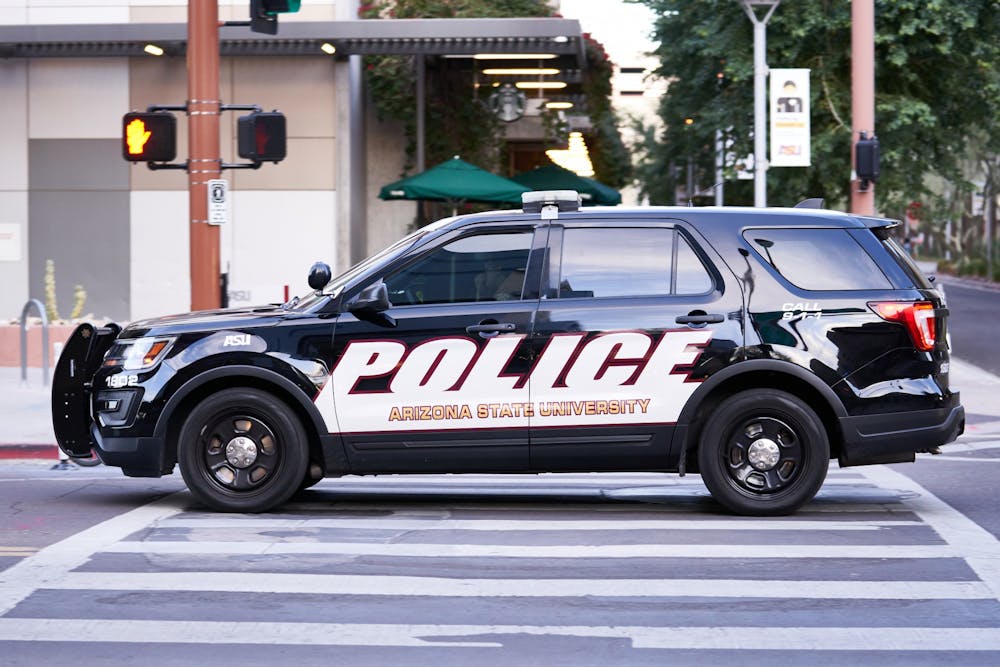Arizona Proposition 311 will establish "a new state death benefit of $250,000 to the surviving spouse or children of a first responder who is killed in the line of duty,” according to the Arizona Legislature.
Students who were raised by first responders said the proposition reflected the risks their families take when going to work. Following the passage of the proposition in November, the state will collect the funds for death benefits by establishing "a $20 penalty fee on every criminal conviction."
Jessica Sanabria, a sophomore studying nursing, said she was always aware of the risks her parents faced while they were at work, but it wasn't until she was older that she realized just how serious their job was.
Her parents worked as first responders in the Los Angeles Police Department — her mother as a detective and her father as an undercover officer. While Sanabria said she was always nervous something might happen to her parents at work, it never occurred to her that their absence could create a financial burden, until her mom got hurt in the line of duty.
Sanabria's mom was injured in a car accident during a police pursuit in 2016, resulting in her retirement. Sanabria's dad had to take on the family's financial burden, forcing him to work until he retired in October 2024 — past his expected retirement date.
"They're older now," Sanabria said. "They deserve to be retired. They worked super hard for so many years of their life."
To help with her mom's surgery and recovery, Sanabria said the government provided her family with some money.
"There should be some type of compensation to help (first responders) and support them because they're doing so much and they're putting their life on the line," Sanabria said. "They didn't wake up that day and expect for that to happen to them."
Jamiyyah Black, a senior studying auditory and language neuroscience and medical studies, said she also grew up with fear for her mom's well-being because her mom was putting her life at risk as a nurse during the COVID-19 pandemic.
"It was really scary because ... I could lose my mom," Black said. "Our parents are everything to us, and my mom has done so much for me, so it was a really scary thought."
Black said that she supports the bill because even though $250,000 is "not that much," it would be enough money to cover initial costs, such as a funeral, for the affected family.
"Losing a parent is awful so it wouldn't take that pain away," Black said. "But at least you know that you do have some financial access."
Prop 311 passed with about 64% of votes in favor of the ballot measure.
While many support financial aid for the families of first responders, the proposition still faces controversies, said Michael Scott, a clinical professor and the director of the Center for Problem-Oriented Policing.
"What's controversial about this proposition is not where the money is going, it's where the money is coming from," Scott said.
Scott said the fees charged to convicts are related to their personal situation and court charges. This $20 fee is different in that it would be put toward a fund that usually has nothing to do with the person paying for it.
"It'd be more of a logical nexus if this was a fee charged only to defendants who were convicted of assaulting or killing a first responder," Scott said.
He said that instead of taking money from every criminal conviction, the state should use the money "that comes out of the general budget (and) is funded by the same taxes that we all pay into to support state and local governments."
Sanabria said that it did not matter to her where the funds were coming from, as long as the families were receiving the money. Sanabria said that her experiences growing up helped her gain more respect for first responders.
"They put their lives on the line every day, and they deserve to be compensated if something were to happen to them," Sanabria said.
Edited by Alysa Horton, Sophia Ramirez, Alexis Heichman and Natalia Jarrett.
Reach the reporter at ehprest1@asu.edu and follow @ellis_reports on X
Like The State Press on Facebook and follow @statepress on X.
Ellis is a sophomore studying journalism and mass communication. This is her first semester with The State Press. She has also worked at Arizona PBS and Blaze Radio.




